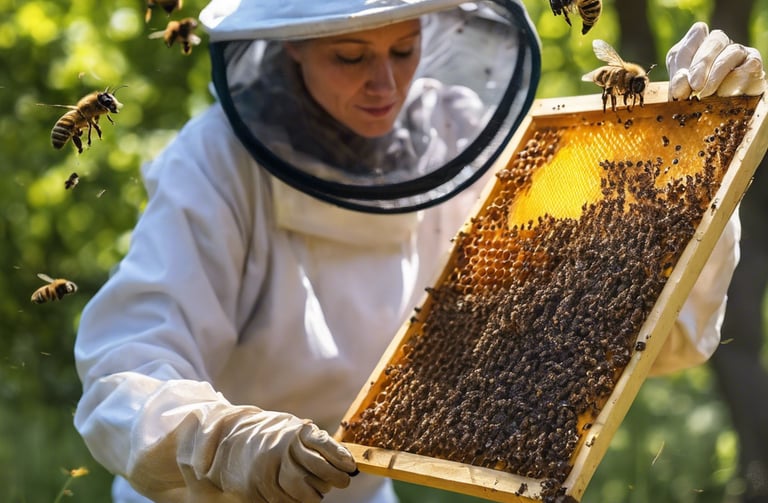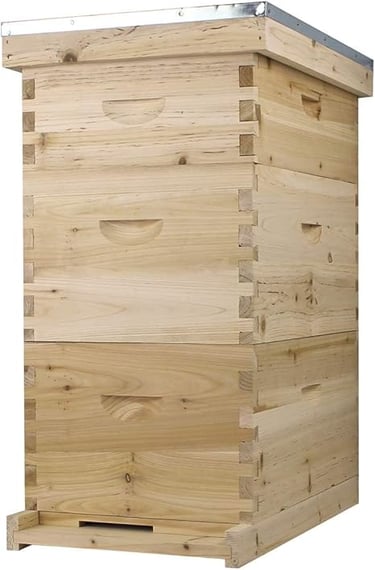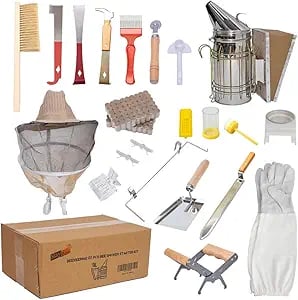Organic and Sustainable Beekeeping Practices: Nurturing Nature and Your Hive
In recent years, the demand for eco-friendly beekeeping practices has soared, leading many beekeepers to embrace organic beekeeping methods. This sustainable approach not only supports the health of bee colonies but also contributes positively to the environment and results in higher-quality honey.
BEE KEEPING
As an Amazon Associate, I earn from qualifying purchases. This means I may earn a commission if you click on an affiliate link and make a purchase, at no extra cost to you.




Bee Hive Complete with Frames & Wax Coated Foundations (NU8-2D1M)


Three Layer Mesh Ventilated Beekeeping Suit, Beekeeper Suit with Fencing & Round Brim Hat, Comfortable, Sting proof Anti Wasp Suit


Ready Hour, Emergency Meal Entrées, Real Non-Perishable Meals, 25-Year Shelf Life, Portable Flood-Safe Container, 120 Servings
In this comprehensive guide, we will explore essential sustainable beekeeping practices, focusing on natural pest control for bees, effective disease management, and critical winter preparation for beehives.
Understanding Organic Beekeeping
Organic beekeeping is a holistic approach that emphasizes minimal intervention and nurtures the bees' natural behaviors. By avoiding synthetic chemicals and focusing on natural processes, beekeepers can foster a healthier hive environment. Key components of organic beekeeping include:
Natural Remedies for Bee Health: Utilizing herbal treatments and essential oils to combat diseases and pests.
Promoting Hive Cleanliness: Regular maintenance to prevent the spread of pests and disease.
Encouraging Natural Behaviors: Allowing bees to thrive in an environment that mirrors their natural habitat.
Essential Organic Practices
Natural Pest Management: Effective pest management is crucial for the vitality of your hive. Organic beekeepers implement various strategies to control pests naturally. Regular inspections help identify potential issues early. Here are some effective methods:
Essential Oils: Incorporating oils like tea tree, eucalyptus, and thyme can provide antimicrobial protection against diseases.
Hygienic Practices: Regularly cleaning the hive and removing dead bees and old comb helps prevent pest infestations.
Integrated Pest Management (IPM): This strategy combines multiple methods to manage pests effectively. Some key techniques include:
Screened Bottom Boards: These allow for ventilation while helping to control varroa mite populations.
Drone Brood Removal: Since varroa mites prefer drone brood, removing it can significantly reduce their levels in the hive.
Foundationless Beekeeping: Allowing bees to build their own comb fosters healthier hives. This method minimizes reliance on synthetic foundation, enabling bees to create comb that meets their natural preferences.
Preparing for Winter: Keeping Your Bees Healthy
As winter approaches, preparing your colonies is vital for their survival. Here are some organic strategies to ensure your bees are ready for the colder months:
Adequate Food Supplies: Ensure your bees have enough honey stores before winter. It’s crucial to leave a sufficient quantity for the bees to consume. If natural stores are low, consider supplementing with sugar syrup or fondant.
Ventilation and Hive Insulation: Proper ventilation is essential to prevent moisture buildup, which can harm bees during winter. Ensure that your hives are well-ventilated while also providing adequate insulation to retain heat.
Regular Inspections: Even during winter, periodic checks can help monitor the health of your hive. Look for signs of disease or distress and be prepared to take action if necessary.
Benefits of Organic Beekeeping
Adopting organic beekeeping practices not only enhances hive health but also leads to the production of high-quality honey. Honey from organically managed hives is free from synthetic residues, allowing you to market it as a premium product. Additionally, these practices promote biodiversity and support healthier ecosystems, benefiting both the environment and your bees.
Additional Benefits Include:
Improved Pollination: Healthier bee populations contribute to better crop yields.
Biodiversity Support: Organic practices help sustain various plant and animal species in the ecosystem.
Consumer Appeal: Increasing numbers of consumers are seeking organic products, enhancing market demand for organic honey.
Conclusion
Embracing organic and sustainable beekeeping practices is a rewarding journey that benefits both beekeepers and their bees. By implementing natural pest management techniques, preparing colonies for winter, and prioritizing hive health, you can create a thriving environment for your bees while producing top-quality honey.
Start your journey toward organic beekeeping today, and join the movement that supports environmental health and bee sustainability!
How to START BEEKEEPING! Inexpensive and Sustainable
Discover engaging content and insights through our carefully curated YouTube videos, designed to entertain and inform our audience about our brand and business activities.

